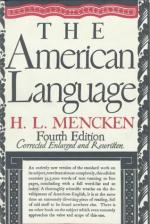|
This section contains 257 words (approx. 1 page at 400 words per page) |

|
Chapter 9.5 Summary
In his chapter on adverbs, Mencken announces the decay of all adverbial endings except -ly. He surveys the history of endings as additions to make new adverbs, considering the endings used by the Anglo Saxons, in Early Middle English, by Chaucer, by Shakespeare, and by early Americans. One of the more telling tendencies, he remarks, is that which helped to alleviate confusion. This tendency was to replace adverbs with adjectives.
Chapter 9.5 Analysis
By Mencken's time, concern for adverbs involved the lack of adverbial endings. The author bemoans the fact that all the endings except -ly disappear from the language. In Anglo Saxon, he reports, -e was first an ending to adjectives, then, with -lic an ending for adverbs. At the same time, since the -e ending on nouns, adjectives, and verbs was no longer pronounced, those e's were dropped. The problem...
(read more from the Chapter 9.5 Summary)
|
This section contains 257 words (approx. 1 page at 400 words per page) |

|




